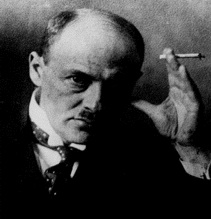 W
WBeing in the World is a 2010 documentary film directed by Tao Ruspoli. The film is based on Martin Heidegger's philosophy and is inspired by Hubert Dreyfus. It features a number of prominent philosophers.
 W
WThe British Society for Phenomenology (BSP) is an organization whose purpose is to pursue and exchange philosophical ideas inspired by phenomenology. It was established in 1967 by Wolfe Mays. The society accomplishes its aims through a journal, an annual conference, and a podcast.
 W
WConsciousness, at its simplest, is sentience or awareness of internal and external existence. Despite millennia of analyses, definitions, explanations and debates by philosophers and scientists, consciousness remains puzzling and controversial, being "at once the most familiar and [also the] most mysterious aspect of our lives". Perhaps the only widely agreed notion about the topic is the intuition that it exists. Opinions differ about what exactly needs to be studied and explained as consciousness. Sometimes, it is synonymous with the mind, and at other times, an aspect of it. In the past, it was one's "inner life", the world of introspection, of private thought, imagination and volition. Today, it often includes some kind of experience, cognition, feeling or perception. It may be awareness, awareness of awareness, or self-awareness either continuously changing or not. There might be different levels or orders of consciousness, or different kinds of consciousness, or just one kind with different features. Other questions include whether only humans are conscious, all animals, or even the whole universe. The disparate range of research, notions and speculations raises doubts about whether the right questions are being asked.
 W
WLifeworld may be conceived as a universe of what is self-evident or given, a world that subjects may experience together. The concept was popularized by Edmund Husserl, who emphasized its role as the ground of all knowledge in lived experience. It has its origin in biology and cultural Protestantism.
 W
WPhenomenology within sociology is the study of the formal structures of concrete social existence as made available in and through the analytical description of acts of intentional consciousness. The object of such an analysis is the meaningful lived world of everyday life. The task of phenomenological sociology is to account for, or describe, the formal structures of the given object of investigation in terms of subjectivity, as an object-constituted-in-and-for-consciousness. What makes such a description different from the "naive" subjective descriptions of the man in the street, or those of the traditional social scientist, both operating in the natural attitude of everyday life, is the utilization of phenomenological methods.
 W
WA phenomenon is an observable fact or event. The term came into its modern philosophical usage through Immanuel Kant, who contrasted it with the noumenon, which cannot be directly observed. Kant was heavily influenced by Gottfried Wilhelm Leibniz in this part of his philosophy, in which phenomenon and noumenon serve as interrelated technical terms. Far predating this, the ancient Greek Pyrrhonist philosopher Sextus Empiricus also used phenomenon and noumenon as interrelated technical terms.
 W
WIn philosophy, a point of view is a specific attitude or manner through which a person thinks about something. This figurative usage of the expression dates back to 1760. In this meaning, the usage is synonymous with one of the meanings of the term perspective.
 W
WMax Scheler (1874–1928) was both the most respected and neglected of the major early 20th century German Continental philosophers in the phenomenological tradition. His observations and insights concerning "a special form of human hate" and related social and psychological phenomenon furnished a descriptive basis for his philosophical concept of "Ressentiment". As a widely recognized convention, the French spelling of this term has been retained in philosophical circles so as to preserve a broad sense of discursive meaning and application. Scheler died unexpectedly of a heart attack in 1928 leaving a vast body of unfinished works. Extrapolations from his thoughts have always since piqued interest and discussion on a variety of topics. His works were on the Nazi book burn list.
 W
WMax Scheler (1874–1928) was an early 20th-century German Continental philosopher in the phenomenological tradition. Scheler's style of phenomenology has been described by some scholars as “applied phenomenology”: an appeal to facts or “things in themselves” as always furnishing a descriptive basis for speculative philosophical concepts. One key source of just such a pattern of facts is expressed in Scheler’s descriptive mapping of human emotional life as articulated in his seminal 1913–1916 work, Formalism in Ethics and Non-Formal Ethics of Values.